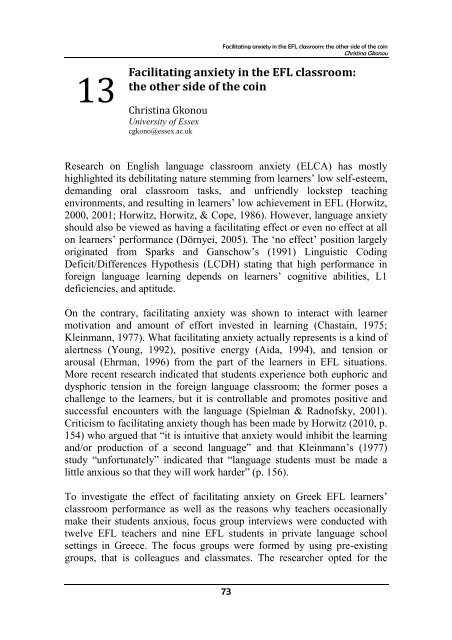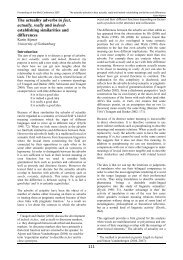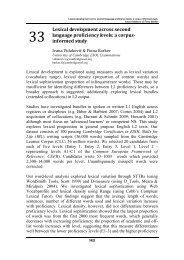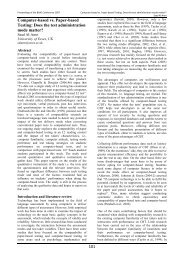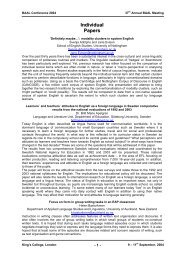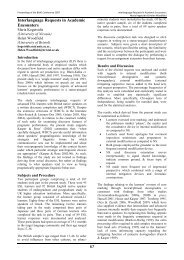Proceedings of the - British Association for Applied Linguistics
Proceedings of the - British Association for Applied Linguistics
Proceedings of the - British Association for Applied Linguistics
Create successful ePaper yourself
Turn your PDF publications into a flip-book with our unique Google optimized e-Paper software.
13<br />
Facilitating anxiety in <strong>the</strong> EFL classroom: <strong>the</strong> o<strong>the</strong>r side <strong>of</strong> <strong>the</strong> coin<br />
Christina Gkonou<br />
Facilitating anxiety in <strong>the</strong> EFL classroom:<br />
<strong>the</strong> o<strong>the</strong>r side <strong>of</strong> <strong>the</strong> coin<br />
Christina Gkonou<br />
University <strong>of</strong> Essex<br />
cgkono@essex.ac.uk<br />
Research on English language classroom anxiety (ELCA) has mostly<br />
highlighted its debilitating nature stemming from learners’ low self-esteem,<br />
demanding oral classroom tasks, and unfriendly lockstep teaching<br />
environments, and resulting in learners’ low achievement in EFL (Horwitz,<br />
2000, 2001; Horwitz, Horwitz, & Cope, 1986). However, language anxiety<br />
should also be viewed as having a facilitating effect or even no effect at all<br />
on learners’ per<strong>for</strong>mance (Dörnyei, 2005). The ‘no effect’ position largely<br />
originated from Sparks and Ganschow’s (1991) Linguistic Coding<br />
Deficit/Differences Hypo<strong>the</strong>sis (LCDH) stating that high per<strong>for</strong>mance in<br />
<strong>for</strong>eign language learning depends on learners’ cognitive abilities, L1<br />
deficiencies, and aptitude.<br />
On <strong>the</strong> contrary, facilitating anxiety was shown to interact with learner<br />
motivation and amount <strong>of</strong> ef<strong>for</strong>t invested in learning (Chastain, 1975;<br />
Kleinmann, 1977). What facilitating anxiety actually represents is a kind <strong>of</strong><br />
alertness (Young, 1992), positive energy (Aida, 1994), and tension or<br />
arousal (Ehrman, 1996) from <strong>the</strong> part <strong>of</strong> <strong>the</strong> learners in EFL situations.<br />
More recent research indicated that students experience both euphoric and<br />
dysphoric tension in <strong>the</strong> <strong>for</strong>eign language classroom; <strong>the</strong> <strong>for</strong>mer poses a<br />
challenge to <strong>the</strong> learners, but it is controllable and promotes positive and<br />
successful encounters with <strong>the</strong> language (Spielman & Radn<strong>of</strong>sky, 2001).<br />
Criticism to facilitating anxiety though has been made by Horwitz (2010, p.<br />
154) who argued that “it is intuitive that anxiety would inhibit <strong>the</strong> learning<br />
and/or production <strong>of</strong> a second language” and that Kleinmann’s (1977)<br />
study “un<strong>for</strong>tunately” indicated that “language students must be made a<br />
little anxious so that <strong>the</strong>y will work harder” (p. 156).<br />
To investigate <strong>the</strong> effect <strong>of</strong> facilitating anxiety on Greek EFL learners’<br />
classroom per<strong>for</strong>mance as well as <strong>the</strong> reasons why teachers occasionally<br />
make <strong>the</strong>ir students anxious, focus group interviews were conducted with<br />
twelve EFL teachers and nine EFL students in private language school<br />
settings in Greece. The focus groups were <strong>for</strong>med by using pre-existing<br />
groups, that is colleagues and classmates. The researcher opted <strong>for</strong> <strong>the</strong><br />
73


